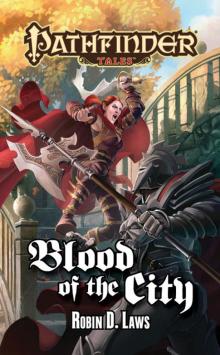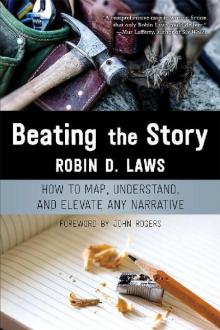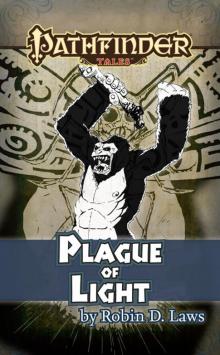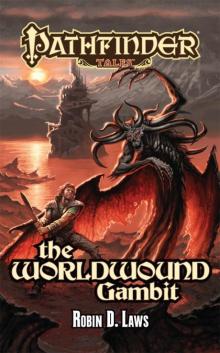- Home
- Robin D. Laws
Blood of the City Page 3
Blood of the City Read online
Page 3
Ontor watched them until they turned a corner and disappeared from sight. "In a fight between them and the Shoanti, I'm rooting for neither."
"They can think of only one way to ask a question," said Iskola. "And do you know what that means?"
"No," said Luma. "What?"
"They will always be pawns."
Chapter Three
Derexhi House
Luma sat in the salon of the family manor. Lined with books and appointed in oak, with stuffed furniture the color of spring leaves, it was her favorite of the many rooms that composed her drafty home. She'd wedged herself into a corner of a large loveseat; not an inch of her could be seen through the room's arch from the adjacent hallway. She read a leather-bound volume of journals by the explorer and venture-captain Vrenn, who visited the land before either of its main cities, Magnimar and Korvosa, had been imagined. The book described in flat detail the author's peregrinations among the Shoanti, and among another, more numerous vagabond people—the sensual Varisians. It was a recent addition to the library, whose books she'd all read from cover to cover, even the boring ones. She'd bought it with her own allowance down in the bazaar. The bookseller tried to pass it off as a rarity, until she quoted his own thoughts back to him.
Luma did not like the idea of a land without citysong. But in the wild magic of the primeval woods, she found touches of awe akin to her own experiences amid Magnimar's streets and monuments.
Vrenn's prose sprang to life only for a single topic: his epicurean adventures. His delirious account of a boar-roast set Luma's stomach to rumbling. She abandoned her book, carefully laying a crimson ribbon between the pages, and padded off to the kitchen.
Returning with a goblet of wine and a bowl of cut apples sprinkled with curds, she passed Iskola and an unfamiliar older woman leaving the meeting room where clients were entertained. The woman's bejeweled, old-fashioned garb revealed her as a patrician among patricians. She smelled of talc and lavender and spoke in a formal accent that was now disappearing even from the Summit's loftiest heights. The woman smiled at Iskola, as she might at a child, and took the liberty of caressing the wizard's face. Though the woman noticed nothing, Luma could see Iskola suppress a squirm. Iskola escorted the woman to the front foyer, where her liveried servants came to attention.
Luma drifted back to the library. Iskola's shadow fell across the pages of her book. She reached into Luma's bowl, snatching up a curd and a slice of apple and popping it into her mouth.
"Who was that?" Luma asked.
Iskola chewed pensively, as if apples were somehow unknown to her. "Our real client."
"From this morning?"
"Alam Scarnetti's grandmother." She spotted the goblet. "What have you opened?"
"It was open already."
Iskola removed the goblet from Luma's hand and took a cautious sip. "Syrinelle?" she said, asking from which grape the wine was made.
"From Riverspire."
"I'll have some, too." Iskola drifted from the room.
Moments later, a familiar musk, of spice and sweat and old slippers, drifted in. Luma bounced from her chair. Her father, Randred, took a seat opposite hers. He placed a ledger book on an adjacent side table, letting it land with a thunk. "Was your sister just here?"
"Iskola? She'll be back in a moment."
Luma had always thought of Randred as the template for all other Derexhi. His head was squarish, his jaw prominent, his eyes dark and well-spaced under a brow now creased with parallel lines. Lately, to the chagrin of Luma's stepmother, he'd granted permission for his white hair to grow out and his beard to flirt with untidiness. He puffed and rubbed at his joints; the effort of lowering his oft-wounded body into the chair gave him pause. A burgundy robe, collared and cuffed in the white fur of the northern bear, draped over his still-wide shoulders. He played with a bulky golden ring, inset with a fat diamond, twirling it absently on his fingers.
The gesture prompted Luma to realize that she'd been chewing at her hair again. She brushed it away with what she hoped would be a concealing gesture.
"That was Urtilia Scarnetti Iskola was meeting with?" her father asked her.
"If that's the name of Alam Scarnetti's grandmother, yes."
He nodded at the clear significance of this.
Iskola returned with the rest of the bottle and two goblets. "I thought I heard you up," she said. She set the glasses on the side table and poured. "I won't tell Mother if you don't."
As Iskola passed him the goblet, Randred momentarily brightened. He drank deep and let his eyes flutter shut. "A fine vintage. And we got the case for a song. The wineseller had no idea of its true worth."
Iskola held up her goblet. "To another assignment, well closed." Luma and Randred joined in the toast.
"That's what I meant to talk to you about," said Randred. "It's not true, is it, that you waived payment for this morning's rescue?"
Iskola stiffened. "That I did, Father." She glanced at Luma, as if willing her to leave the room.
Luma savored a curd.
Randred shifted forward. "You of all people, Iskola, should understand the state of our finances. This household bleeds money. Yet we cannot allow ourselves to curtail outward fripperies, as we would lose standing with the other houses, who purchase our services."
Iskola sighed and settled into a chair. Luma felt sorry for her; when her father took it upon himself to lecture, there was no interrupting, even if everyone in the room had the speech committed to memory.
"You must not underestimate the value of the top squad. The rest of our business—the sentinels, the bodyguards, the rumor-gatherers—for these our margins are slim, because of the competition. It is you—Luma, and you, and the others—who offer what our rivals cannot. You comprise this concern's premium inventory. Your magic, your swords, your reputation and resourcefulness ...No one in Magnimar can do what you do. For this we must charge a remorseless mark-up. You simply cannot use the team's time as an incentive for other business. Do you think that Urtilia Scarnetti will hire a dozen more guards than she needs, now that you've scooped up her scapegrace grandson?"
Iskola jumped on the question. "Of course not, Father. I didn't give her a gift. I put her in my debt. When was the last time you took your council seat?"
Randred shifted his weight back into the chair. "Pah. The ceremonial occasions are bad enough. I can no longer sit for all that wrangling."
"In that wrangling lies our future. You haven't been paying attention, but Urtilia Scarnetti has been amassing allies on the council. She's a faction unto herself—"
"Until Amarai Burda decides to reel her in, you mean."
"Amarai Burda hasn't left her bedchambers in months. She isn't expected to live out the year. It's Urtilia now. This is why you should cede your seat to Arrus, so someone who wants to protect our interests can do so."
"Pfft!" Randred finished the contents of his goblet. "Arrus would sooner wrestle a fire giant. What about Luma? She's the eldest."
"Be serious, Father."
Luma's ears burned. She told herself not to be offended. She didn't want the family council seat. Certainly she did not expect it. And Iskola's brusqueness was not aimed at her, in particular. It was her way. Still, the ease of her disregard rankled. Luma retreated further into the corner of her chair.
"Arrus wishes to politick now?" Randred asked.
"He's better at it than you imagine."
"His capacity I don't doubt. He's handsome, charming, with a touch of the bully about him—the perfect combination. He could go far, were our lord-mayor not unassailably ensconced." Puffing with the effort, he turned his chair to face the side table. Iskola moved to help; he waved her off. "What I question about his new hobby—or yours—is the price." He licked a finger and paged through the ledger. "Is this why you've been giving the squad's services away? Politics?" Randred jabbed at an entry. "Kaia Shilba—future considerations. Viokala Jaberyni—future considerations. Lenehti Mintisio—future considerations. All im
portant councilors. Useful to have on our side should trouble come, I grant you. But. Future considerations won't pay our forces. Or our servants, or our vendors." He closed the ledger. "Bank a few favors, Iskola, here and there." Randred stood, chucking Iskola under the chin. "But slow down, my dear."
"Understood, Father."
He pulled her to him, enfolding her in a tight embrace. "Neither he, nor you, will be ready to take over until you learn to worry." Randred released her. "At your age, I was just as rash. More so. It's what allows you to burst through a hovel full of cutthroats and cut them down. The squad needs your impetuosity." He gazed down at his ruined physique. "Don't hurry to become this creaky bag of bones."
Iskola kissed his cheek. "Good night, Father. You have a long time yet to creak." She glided from the room.
Randred leaned over Luma to refill her goblet. "Sunk in melancholy again, I see."
"It's nothing, Father."
He emptied the rest of the bottle into his own vessel and lowered himself into his chair. "Count your blessings on one front, my darling. At least you'll never have to run this house." Randred pulled a candle closer to his account book. "If you'd been born in proper wedlock, you'd have this to look forward to. When I was your age, I dreaded having to do what my father did. And I was right."
"It can't be so bad."
He rubbed his forehead. "It is, but deservedly so. I gave my father as much trouble as they do now. The wheel turns, doesn't it? Sometimes I wish the law were different, and I could make you heir. The rest of us could use a touch of your quiet."
She rose to wrap an arm around his shoulder. "We are who we are."
Randred patted her hand. "There's no greater truth than that." He chuckled. "I could give you the council seat, if you want it. The law says the estate must go to the eldest legitimate male heir. It says nothing about the seat, though people assume otherwise. The pretension of it! As if any in Magnimar are true nobles. The loftiest of us are dirt-shod scrabblers, six generations removed. Now we surround ourselves with marble monuments and call ourselves aristocrats. Nonsense. Would you want it?"
"What?"
He winked at her. "The council seat. That would teach the rest of them a lesson, wouldn't it?"
Luma withdrew. "I don't think that would be a good idea."
"I suppose not. Then I've no choice for the moment than to keep it warm myself."
∗ ∗ ∗
The next morning, Luma sat at her window, taking in the citysong, when Bhax, the family's white-haired senior butler, knocked on the door. He bore a message from Arrus, summoning her to the squad room. Luma considered pulling a comb through her hair before acknowledging the futility of any attempt. She moved through oak-paneled corridors, passing portraits of her ancestors on her human side. Each head of House Derexhi gazed determinedly from his canvas, swathed in armor and proudly scarred. Randred's portrait hung at the end of the line. Painted a decade ago, it depicted a harder, freer man, his brow unfurrowed. The painted Randred, Luma thought, could not conceive of a problem that would not yield to his stunningly detailed sword.
She found Ontor in the squad room as well. The two brothers competed at a knife-throwing game. Two leather purses sat on the table, promising reward for victory. Ontor would win, of course. But Arrus would come closer than he had the last time he lost, and would fume and fret and accept the pain of the defeat as the cost of doing better next time.
Ontor, pretending to be distracted by her arrival, took a step off balance, breaking his ideal posture. He threw at the wrong time. Yet the knife flew unerringly for the bull's-eye. Ontor could not refrain from a small jump of delight. Arrus's expression tightened. Luma read what it meant: only at this moment was he realizing that Ontor had been holding back, even while consistently beating him. He was much further from catching up than he'd imagined.
Nonetheless, he placed himself at the red line on the squad room floor, knife ready to throw. "Luma, an assignment for you."
"Yes?"
His knife sailed through the air to land in the target ring next to the bull's-eye. He hissed through clenched teeth. "You're needed to shadow Khonderian. You know of him?"
Luma nodded. "The chief of the lord-mayor's bodyguard?"
"The same."
Ontor removed the knife, stepped up to the line, and made a show of concentrating.
"Why?" asked Luma.
"Why what?" answered Arrus.
Neatly maintaining the illusion of a close game, Ontor hurled the knife precisely into the same ring of the target his brother had struck.
"If I'm following the lord-mayor's chief bodyguard, aren't I also following the lord-mayor?"
"No," said Arrus. "He commands the bodyguard but doesn't go out on detail with them. Any man who works with sword or knife and answers to the lord-mayor takes his orders from Khonderian."
"So he's the lord-mayor's dagger, then."
"That's right."
"And why am I trailing him?" asked Luma.
"Can't tell you," Arrus said.
"Oh."
Arrus removed the knife from the target and marched to the line. "You may go about it now."
"What am I looking for, then?" Luma asked.
"Whatever he does, wherever he goes, whoever he talks to. Note it and report back to me."
"Who's the client?"
Arrus sized up his throw. "Had I meant to tell you, I would have."
"You don't trust me to keep my mouth shut?"
He threw the knife. It barely made the target. Arrus swallowed a curse. "I don't need your pestering this morning."
Ontor retrieved the knife from the target, but hung back from the red line.
"Good work comes from good briefings," Luma said.
"Don't quote Father at me," said Arrus. "Just get going."
Luma let the door slam on her way out.
Ontor followed her down the corridor. "Wait, Mouse, wait."
Luma stopped. "What?"
He turned her around. "You know he's always like that when he's losing."
She wouldn't look at him. "Yes, he is always like that. That's why I'm mad."
"I've been meaning to talk to you, Mouse. You can't go slamming doors like that."
"It's my fault?"
"It's not—it's not a matter of fault," Ontor searched for words. "There are ...repercussions. I'm saying this because I care. I see you're unhappy and I don't like that. You understand?"
"Sure."
"It would all be fine if you made an effort to get along more."
"If I made—"
"I know, I know, I know ...it shouldn't be you who has to. You're right. Completely so. But then there's another side to it, too."
"How can there be another side if I'm completely—"
"See?" Ontor said. He pulled her into the armory so their voices wouldn't carry down the hall. "Arguing back like that. It isn't ...endearing. It would all go so much better for you if you tried to go along a little more."
"When do I not do as they ask?"
"You do it, but you slam, you shuffle, you slump. They want to feel you're one of us. Make them think you respect them."
"I do. When we go into a fight, we depend on each other ..."
"Of course. Not that kind of respect. I mean, here, around the house. Be charming. It's what you'd do with a witness you wanted something out of, right? Make them feel good."
"Kiss up, you mean?"
"Okay, sure," Ontor said. "Kiss up. The tiniest bit would help."
They could hear Arrus yelling for a resumption of the game.
"I shouldn't have to," Luma said.
"Luma, Luma." Ontor put a hand on each of her shoulders. "Luma, maybe that's true. This is a family. We all love you. But—but ...it would be easier all around if more of us liked you."
Chapter Four
Street of Taverns
Luma caught up to Khonderian in the Capital District, as he exited the Pediment Building, where his and the lord-mayor's offices were located.
She followed him across the monument-choked Way of Arches into Bridgeward, the artisan's district.
A receding hairline and prominent, chestnut-colored widow's peak extended Khonderian's face. He wore his hair long and scraggly, over a nondescript leather jerkin of an approximately matching shade. Patchy stubble dirtied his chin. At his hip swung a scabbarded longsword. Luma noted knives hidden in each of his boots, and strapped by an armband under his right sleeve. No detail of his dress or equipment suggested a high post. Nor did he project an air of intimidation.
In the quick, casual movements of his head, Luma recognized the constant yet masked awareness of a professional observer. He loped along, moving to avoid knots of people and the threat of conversation. Nonetheless citizens occasionally spotted and hailed him. Each time he waved, breaking into a grin that exposed a bright white overbite, and moved on without slowing.
To evade his gaze, Luma rode the swells and crests of the citysong. When it grew louder, it foretold some hubbub or distraction ahead. Prepared for this, she could take chances, closing the gap between herself and her quarry, sure that his eye would fall on whatever unexpected commotion was about to cross their paths. When it quieted, she hung back so that she would not be caught in a sudden gap, standing out on an otherwise empty street.
As she shadowed him, Luma rehearsed a speech for Arrus. She couldn't help imagining what she might say, even if she wouldn't, in the end, dare voice it. No longer could she work this way, without full knowledge. Whatever she was looking for would be easier to find if she'd been told what it was. Surely they meant her to get close enough to him to pick out his thoughts. Yet Arrus hadn't said so.
Most likely it was a political job. Probing Khonderian for an unexploited weakness that could be used to blackmail him, or force him out. The lord-mayor's dagger would be a useful person to have in one's pocket. Any number of councilors and luminaries doubtless worried that their secrets might be rattling around in his head. Equally likely, their client wanted him to spill those of others.
Shades of pink and orange streaked the clouds. The citysong always changed its pitch at this time of day, when work ended and the people of Magnimar turned to play. The shift just as reliably brightened Luma's mood. She felt the anticipation of laborers headed for taverns, of lovers anxious for reunion, of mothers relieved that their sons and daughters had made it safely through another day.

 Blood of the City
Blood of the City Beating the Story
Beating the Story Plague of Light
Plague of Light The Worldwound Gambit
The Worldwound Gambit